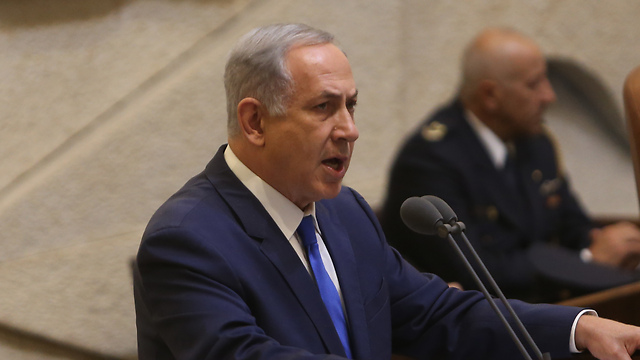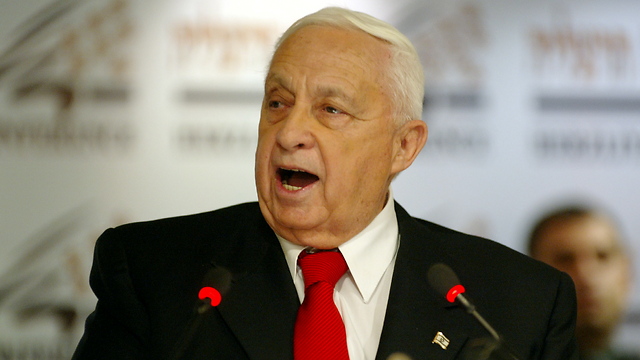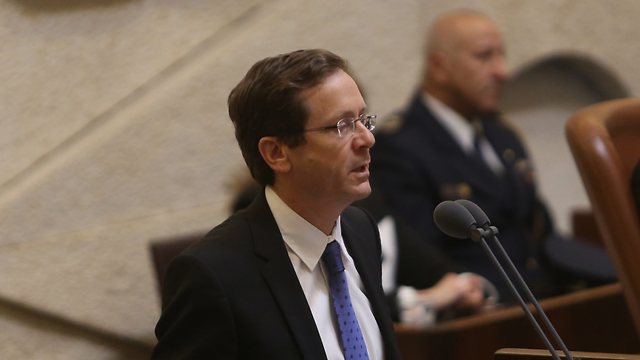While the prime minister slams the late leader’s unilateral move, saying it only served to bolster the terror groups in the Strip, Herzog praises the move and calls to continue on Sharon’s path.
Prime Minister Benjamin Netanyahu chose a special Knesset meeting in memory of former prime minister Ariel Sharon on Monday to criticize the late leader’s decision to unilaterally disengage from the Gaza Strip.
The parliament session, also attended by Sharon’s sons Omri and Gilad, marked two years to the late prime minister’s passing.
Addressing the plenum, Netanyahu said that the Gaza disengagement – in which Israel withdrew from the Strip completely, evacuating all Jewish settlements there – has aided terror groups in the enclave.
“Unfortunately, giving the responsibility for governing (Gaza) to the Palestinians not only did not put us on the path to peace, but increased the armament of terror groups,” he said.

But Netanyahu also had praise for the late leader of the Likud party and later the founder of the breakaway Kadima party.
“Ariel Sharon left his clear mark on the State of Israel. He gained his fame in the 1950s when he commanded the legendary Unit 101’s retaliatory operations. He pushed for a change in the IDF and advocated the perception that the Jewish state was formed to give Jews back their rights and the ability to defend themselves. Today as well, and not by chance, we still implement this very principle. My brother and I aspired to serve in elite units precisely because of the norms Arik incorporated in the IDF,” he said.
The prime minister also spoke of Sharon’s decision to launch Operation Defensive Shield, saying that “the Yom Kippur War gave the final confirmation to those who needed it that Arik was one of the best commanders the IDF has ever had. After the war, he went on a long political career as a minister in Israeli governments, and contributed to settlements, agriculture, industry and to the development of infrastructure. Without his backing, I would not have been able to execute necessary reforms as a minister in his government.”

Opposition leader Isaac Herzog, meanwhile, praised Sharon’s decision to disengage from Gaza. “During his last term in office, Sharon identified the demographic danger. Identified it, talked about it, and did something about it. He saw a million and a half Palestinians in Gaza who were growing in numbers, and decided to disengage from them, so they won’t be a part of the State of Israel, and in order to keep Israel a Jewish state. I hear all of those who want to annex Judea and Samaria to the State of Israel, along with the Palestinians there. They keep attacking Ariel Sharon for the disengagement from Gaza, but it’s interesting that I haven’t heard any of them suggest we go back to Gaza.”

Herzog went on to say that “a part of us was here in 2004 and 2005 when Sharon presented his plan to evacuate Gaza and the northern Samaria, the disengagement plan. Without getting into the dispute over the plan itself, you could not help but be in awe of his daring and leadership. Like a solid rock, he did not blink or falter. He wasn’t afraid to confront his party, the Likud center and his closest allies. His political and diplomatic conduct at the time was unique and original, straight out of school for leadership and politics.”
The Zionist Union leader called on the State of Israel “to continue what Sharon started in order to keep Israel a safe, Jewish and democratic country. We must complete the separation fence Sharon started building. This is the fence that completely stopped the suicide bombers. Now we need to complete the fence to stop the knife-wielding terrorists. This fence will separate us and the Palestinians in Judea, Samaria and the Jerusalem area. A fence that will give us security – and let them live their lives. A fence that would stop the slow annexation and the movement towards a binational Jewish-Arab state.”
As reported by Ynetnews
